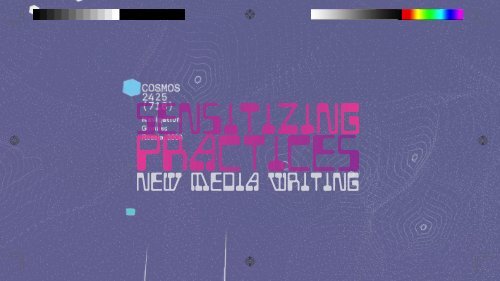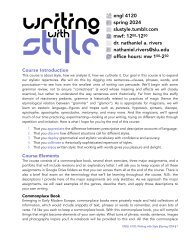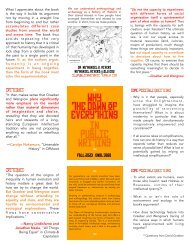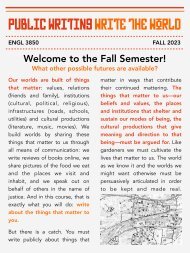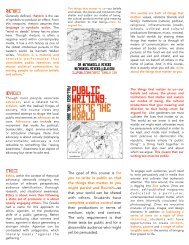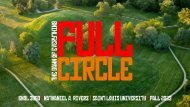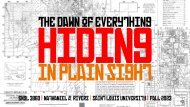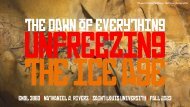ENGL 4010: Sensitizing Practices Slide Deck (SP23)
Create successful ePaper yourself
Turn your PDF publications into a flip-book with our unique Google optimized e-Paper software.
<strong>Sensitizing</strong><br />
<strong>Practices</strong><br />
New Media Writing
Gabrys And Pritchard<br />
Sensing practices refer to the ways in which sensing<br />
and practice emerge, take hold and form<br />
attachments across environmental, material, political<br />
and aesthetic concerns, subjects and milieus (394).
Gabrys And Pritchard<br />
Sensors do not merely capture environmental data,<br />
but rather they are involved in collaborative sensing<br />
practices for parsing environments and environmental<br />
problems, as well as organizing approaches for how to<br />
take action and generate political responses through<br />
particular forms of environmental citizenship (395-396).
Gabrys And Pritchard<br />
This common world is not so much a place where<br />
entities agree to show up, but rather is a milieu among<br />
a diversity of milieus that is actively made<br />
through shared inhabitations and experiences<br />
(396).
Gabrys And Pritchard<br />
Citizen sensing also constitutes<br />
a set of sensing practices that is<br />
meant to enable and empower<br />
people to sense for political<br />
effect (394).
How do we make ourselves actually sensitive<br />
Latour<br />
(315)?<br />
To capture that activity, I will use the word<br />
aesthetic—in the original Greek sense of<br />
aisthesis—perception, or making oneself<br />
sensitive to something (315).
If we remember the etymological sense of<br />
Latour<br />
aesthetic as making sense, how does a specific<br />
medium render us sensitive to things as they<br />
come to us? Things can come to you, but if you<br />
don’t render yourself sensitive to them, you just<br />
don’t get it (319).
How do we make ourselves sensible not to matters of<br />
Latour<br />
fact as they are fictionalized in the subject-object<br />
scenario, but rather to matters of concern? Matters of<br />
concern are still material. It's not so much their<br />
factuality or materiality that should interest us, but our<br />
concern with them. How can art and science<br />
sensitize us to these concerns (319)?
“Tipping Away” Illustrations by Max Gather for New York Times Magazine.
Latour<br />
It’s a very difficult question of producing the right kind of communication to<br />
register on the already-insensitive, to produce the right register in which to<br />
make an address (323).
Giant Golden Orb-weaver, Nephila pilipes<br />
[T]he Japanese orb-weaver Oclonoba<br />
sybotides changes the structure of its<br />
own web when it is hungry. It adds<br />
spiral decorations that increase the<br />
tension along the spokes, improving the<br />
web’s ability to transmit the weaker<br />
vibrations transmitted by smaller prey […]<br />
To capture such morsels, the spider<br />
expands the range of its sense by<br />
changing the nature of its web.<br />
But here’s the truly important part:<br />
Watanabe found that a well-fed spider will<br />
also go after small flies if it is placed onto<br />
a tense web built by a hungry spider. The<br />
spider has effectively outsourced the<br />
decision about which prey two attach to its<br />
web […] The web, then, is not just an<br />
extension of a spider’s senses but an<br />
extension of its cognition. In a very<br />
real way, the spider things with its<br />
web. Tuning the silk is like tuning its<br />
own mind.<br />
—Ed Yong, An Immense World
Phyphox<br />
iNaturalist<br />
The Architecture of Radio<br />
Merlin Bird ID
Latour<br />
It gets modified, mobilized, or moved—and you are then<br />
moved by the thing you move, which is the most<br />
interesting relation we have with the world (321).
<strong>Sensitizing</strong><br />
<strong>Practices</strong><br />
New Media Writing


